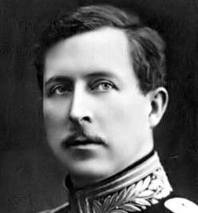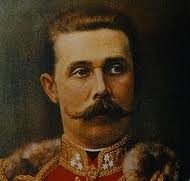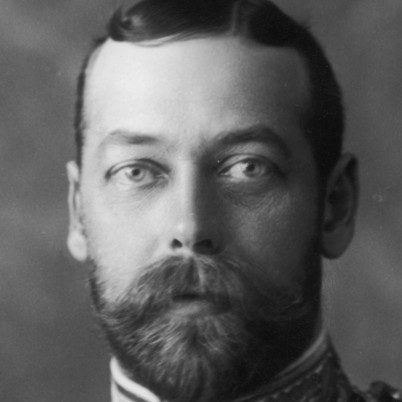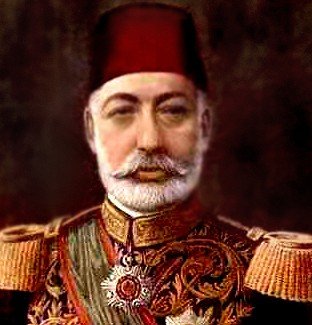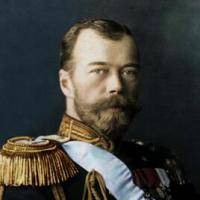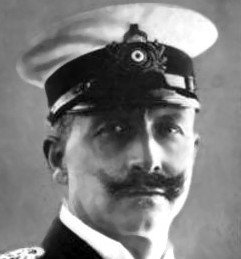Albert I (1875-1934) was the reigning king of Belgium during World War I. Albert ascended to the throne after the death of his father, Leopold II, in 1909. Reports from his contemporaries suggest that Albert was an intelligent, curious and popular royal; he was deeply patriotic, devoted to his Catholicism and showed a strong interest in the welfare of others, particularly his countrymen.
In August 1914 Albert, acting on advice from the British government, refused a German request to move troops and equipment across Belgian territory. When the German army invaded Belgium, Albert took personal command of the nation’s armed forces; he also addressed the Belgian parliament and called for “stubborn resistance”. He was personally involved in resisting the German advance, commanding forces in Antwerp and the Yser River; Albert’s wife also worked as a nurse, while his 14-year-old son (the future Leopold III) saw brief service as an infantry private.
Albert was under considerable pressure to formally join the Allies, however he refused, preferring to keep Belgian forces entirely under his command; he also wanted the option of negotiating a separate peace with Germany. Albert was hailed as a war hero by his own people, whose interests he had protected stoically. He was later killed while mountain-climbing in western Belgium.
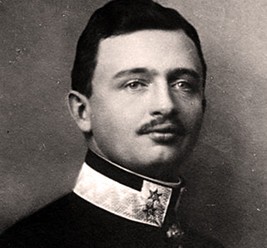
Charles I (1887-1922) was an Austrian royal who became ruler of the Austro-Hungarian empire in late 1916. Charles was the nephew of Archduke Franz Ferdinand and the great-nephew of Emperor Franz Josef.
Charles became heir to the imperial throne after Franz Ferdinand’s murder in June 1914 (the archduke’s morganatic marriage meant that his own children were disqualified from the line of succession). An educated, intelligent and likeable young man, Charles was given significant command duties during the war, despite having only limited military experience. He became emperor in November 1916, after the death of Franz Josef.
Alert to the dangers faced by his empire, Charles sought to hold it together by extricating Austria-Hungary from the war, as well as liberal political reforms and self-government for regional and ethnic groups. In 1917, using his brother-in-law as an intermediary, Charles made several overtures for a peace proposal – either with or without the involvement of his German allies.
In May 1917, the emperor recalled the Austrian parliament, which had been suspended by his predecessor. In October 1918 Charles attempted to re-form the Austro-Hungarian empire as a federation of self-governing states. This did not go far enough, however, and Charles lost the throne during the political upheavals of November 1918. His attempts to regain the crown came to nothing and he was forced into exile, dying there in 1922.
Franz Ferdinand (1863-1914) was an Austrian archduke, the nephew of Austro-Hungarian emperor Franz Josef. Like many young royals of his time, Ferdinand received a military education and training, before being commissioned in the Austrian army at the age of 14. His involvement with the military declined after 1889, when Ferdinand became heir to the Austrian throne, following the suicide of Prince Rudolf (Franz Joseph’s only son).
Ferdinand was an excellent candidate for a constitutional monarch: intelligent, realistic, well-travelled and much less conservative than his ageing uncle. He could also be stubborn, a quality made apparent by his determination to marry the commoner Sophie Chotek.
As heir to the Austrian throne Ferdinand took an active interest in both foreign affairs and military matters. He was on friendly terms with German ruler Wilhelm II, the two often meeting to discuss military and naval developments. This made Ferdinand unpopular with the British press, which unfairly painted him as a dangerous radical or a puppet of the Kaiser.
Franz Ferdinand’s best known contribution to history, however, was his death. While on an official visit to the Bosnian capital Sarajevo in June 1914, Ferdinand and his wife were gunned down in their car by a teenaged Serbian student. The archduke’s murder triggered the chain reaction of threats, ultimatums and military mobilisations that soon gave rise to World War I.
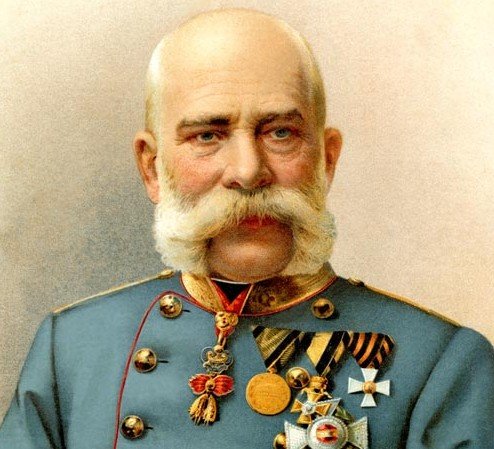
Franz Joseph (1830-1916) was the ruler of the Austro-Hungarian dual monarchy from 1848 until his death in November 1916. Born in Vienna, Franz Joseph was a scion of the Habsburg dynasty and the nephew of the reigning emperor, Ferdinand I. He received a military education and entered the army, acquiring the rank of colonel while still in his teens.
Franz Joseph became emperor shortly after his 18th birthday, following the abdication of both his uncle and his father. He spent the first decade of his reign consolidating the dual monarchy and dealing with its turbulent jigsaw of nationalist and sectarian interests. Though his empire was often divided and his politicians corrupt or incompetent, Franz Joseph was a constitutional monarch who maintained some distance between himself and his ministers. As a consequence he enjoyed the respect of the people, who considered him to be intelligent, fair and steady.
Franz Joseph’s contribution to the outbreak of World War I has been a source of some contention. The old emperor was undoubtedly a 19th century militarist: he viewed the empire’s army with pride and showed more interest in it than in any other aspect of government.
Franz Joseph had a troubled relationship with his nephew and heir, Archduke Franz Ferdinand, who he considered too flighty and progressive to follow as emperor; nevertheless he was outraged by Ferdinand’s assassination. Evidence suggests that while Franz Joseph supported military action against Serbia, he was hesitant about committing his army to a war with Russia. But the emperor followed the advice of his ministers and his generals, to whom he also left the running of the war. The ageing Franz Joseph became ill in 1916 and died late in the year, the throne passing to Charles I.
George V (1865-1936) was the king of Britain and the British Commonwealth for the entirety of World War I. The second son of Edward VII, George was not initially destined to become king, however this was changed by the death of his brother from influenza in 1892.
George ascended to the throne on the death of his father in 1910. Though a man of strong political opinions, George ruled as a constitutional monarch, leaving matters of policy to his ministers and the parliament. The declaration of war against Germany placed the British king in an awkward position: Kaiser Wilhelm II was his first cousin, while a great many of the British royal family were of German extraction or carried German names and titles. In 1917, the king demonstrated his loyalty to Britain by changing his own dynastic name, Saxe-Coburg-Gotha, to the more English-sounding House of Windsor.
For the duration of the war the king made no intrusive decisions of his own but took regular briefings from both civilian politicians and military commanders. He also made scores of visits, both public and private, to army training facilities, military hospitals and the like. His wartime service was thus that of a figurehead, rather than a significant decision maker.
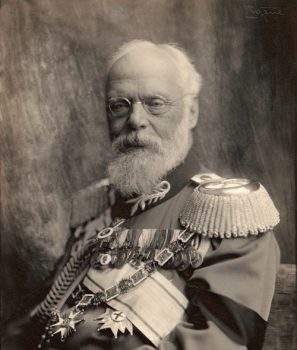
Ludwig III (1845-1921) was the King of Bavaria from 1913 until November 13th 1918, two days after the armistice that ended the war. A scion of the Wittelsbach dynasty, Ludwig was born in Munich, given a liberal education and saw military service in the Austro-Prussian War. Throughout his life Ludwig showed great interested in economic, agricultural and technological progress – but as a devout Catholic and conservative he was opposed to social and political change.
Ludwig ascended the throne in 1913, displacing his insane cousin Otto, with the support of the Bavarian parliament. At this time Bavaria was, after Prussia, the second largest kingdom of the German Empire – however, it had significant autonomy, its military controlled by Munich rather than Berlin.
When war broke out in July-August 1914, Ludwig pledged his support for the kaiser and committed Bavaria’s three armies to the war effort. But the war took its toll on Bavaria and by 1917 the popularity of the king, viewed by many as a Prussian puppet, had plummeted. When the German Revolution reached Bavaria in the final days of the war Ludwig fled to Austria, where he later signed documents relinquishing political power. He died in exile in 1921.
Mehmed V (1844-1918) was the 35th and second-last sultan of the Ottoman Empire. Like the Ottoman sultans before him, Mehmed was given a peculiar upbringing of seclusion, isolation and self-study. Contemporary reports suggest that he was well educated, thoughtful and mild mannered, though perhaps indecisive.
Mehmed was crowned in 1909, not long after the Young Turk revolution which radically reduced the power of the sultanate. For the duration of his reign Mehmed was little more than a figurehead, a puppet of the Young Turks who had grasped political control five years before. Significant policies were decided by a trio of politicians led by war minister Enver Pasha. The sultan was obliged to endorse them, even if he did not agree.
In November 1914, Mehmed signed the Ottoman Empire’s declaration of war, the wording of which called on Muslims living in Allied countries to rise up against their colonial masters. Privately, however, Mehmed believed Ottoman involvement in the war was a mistake that jeopardised the already fragile empire. History proved him correct and within months of his death, Ottoman territory was being occupied and redistributed.
Nicholas II (1868-1918) was the tsar (emperor) of Russia until his overthrow in March 1917, caused in large part by World War I. The son of the autocratic Alexander III, Nicholas was unlike his powerful father: he was short, quiet and reserved, with only a passing interest in the business of government. In late 1894 he married Alix of Hesse, a strong-willed German princess; it was a marriage of love rather than political convenience, and they remained close and affection all their lives.
Nicholas’ 23-year reign was marred by errors and misjudgements. In 1904, the tsar’s attempts to expand Russian influence in Asia led his country into a brief but disastrous war with Japan. Nicholas then survived a popular but disorganised attempt at revolution in 1905, chiefly by making promises of reform that were later broken.
The tsar led his empire into World War I, blinded by a naive belief that Wilhelm II would not wage war against his own cousin. After a year of Russian military defeats, disasters and command ineptitude, Nicholas took charge of the army and left for the Eastern Front. Though he interfered little in command decisions, Nicholas’ direct association with the war, along with his absence from the Russian capital, proved fatal for tsarism.
When a protest turned into a revolution in February 1917, Nicholas hastened back to Petrograd – but he stopped en route by civilian politicians, who demanded his abdication. The war brought about the end of three centuries of tsarist rule under the Romanovs and paved the way for the rise of socialism in Russia. The tsar and his family were held under house arrest for a time, before being executed by communist partisans in July 1918.
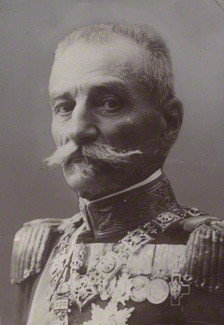
Peter I (1844-1921) was the king of Serbia from 1903 until immediately after World War I. Born in Belgrade, Peter was the son of Alexander Karageorge, a Serbian prince who struggled for autonomy from the Ottomans.
Alexander was forced to abdicate in 1858 and Peter, then aged 10, fled the region. He spent the next 45 years in exile, much of it in France, where Peter trained as a cavalry officer and fought as a volunteer in the Franco-Prussian War. He also returned to the Balkans and participated in a Bosnian Serb uprising against Ottoman rule.
In 1903, Peter became king of Serbia, selected to replace the assassinated Alexander I. A political liberal, he transformed the Serbian state into a constitutional monarchy, earning praise both at home and abroad. Serbia’s victories in the Balkan Wars further enhanced Peter’s popularity and he became a figurehead for Serbian nationalists.
In mid 1914 the 70-year-old king, now in poor health, surrendered most of his royal powers to his son, though he remained the titular king of Serbia. Peter’s contributions to the war effort were restricted to morale boosting battlefield visits, though he did lead a military exodus from Serbia in late 1915. He again lived in exile, returning to Serbia in 1919 and dying two years.
Wilhelm II (1859-1941) was the kaiser (king) of Imperial Germany, the nominal national leader during the war, and the individual many deem the most personally responsible for the outbreak of World War I.
Wilhelm was born in Berlin, the son of a future German king and his English wife. As a boy he received a typically authoritarian upbringing and education, filled with high expectations, little encouragement and cruel punishments. His contemporaries describe Wilhelm as informed, intelligence and well travelled, but also moody, short-tempered and insecure.
When he came to the throne in his 30th year, the new kaiser responded by ousting the respected Count von Bismarck from the chancellorship. Driven by his love-hate relationship with Britain, Wilhelm wanted to expand Germany’s navy and imperial possessions to rival those of the British. His intemperate remarks and undiplomatic behaviour instigated several intentional incidents in the years prior to 1914, such as an inflammatory speech given in French-aligned Morocco in 1905.
The kaiser’s support for the Austro-Hungarian regime in 1914, as well as his hesitation and indecision, contributed to the July crisis and the outbreak of war. Wilhelm’s leadership during the war was ineffectual and superficial. The kaiser exerted no real influence on military matters; in most cases he simply acceded to the wishes of his generals. By late 1917 Germany was a de facto military dictatorship under Hindenburg and Ludendorff, with Wilhelm nothing more than a symbolic monarch.
In November 1918, with his nation on the brink of defeat and his authority in tatters, the kaiser came under intense pressure to abdicate the throne; even this decision had to be made for him by others. Wilhelm fled to the sanctuary of neutral Holland, where he was sheltered for the rest of his life by the Dutch royal family, despite numerous calls that he be extradited and put on trial for his role in starting the Great War.
© Alpha History 2018-23. Content on this page may not be republished or distributed without permission. For more information please refer to our Terms of Use.
This page was written by Jennifer Llewellyn, Jim Southey and Steve Thompson. To reference this page, use the following citation:
J. Llewellyn et al, “World War I royals” at Alpha History, https://alphahistory.com/worldwar1/world-war-i-royals/, 2014, accessed [date of last access].

